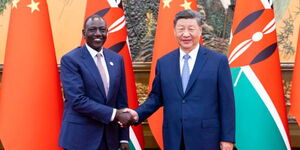The International Monetary Fund (IMF) has introduced a new set of conditions for Kenya to access its Ksh150 billion precautionary loan that was suspended in September 2018.
A report published by the EastAfrican on Tuesday, December 4, indicated that Kenya would need to oblige to the set conditions before the international lender released the funds to the country in early 2020.
According to a team of IMF officials who visited the country between November 18 and November 22, 2019, led by Benedict Clements, the Treasury would need to cut back on the fiscal deficit which averaged 7.7% of the country's GDP in the 2018/2019 financial year.
The international lender expressed its concerns over the rising fiscal deficit hinting that it could plunge the country into debt distress.
The IMF indicated that it had held talks with acting Treasury Cabinet Secretary Ukur Yattani, Central Bank of Kenya Governor, Patrick Njoroge, the Head of Public Service, Joseph Kinyua, among other senior government officials.
Kenya's public debt hit Ksh5.6 Trillion in September 2018 and was projected to surpass Ksh6.5 Trillion by the end of 2019. However, the debt repayment for the 2018/2019 fiscal year amounted to Ksh775 billion as reported by the Kenyan Wallstreet.
IMF expected the government to make tax and expenditure reforms that did not sabotage Kenya's economic growth nor subdue the private sector.
“Progress in this direction (reduction of fiscal deficit), including the design of tax and expenditure reforms that support a growth-friendly fiscal consolidation, would be important to anchor a new Fund-supported programme,” the IMF stated in a statement.
Despite the prevailing uproar, the IMF praised the rate cap removal stating that it allowed for more credit to the private sector and granted the Central Bank of Kenya more monetary policy flexibility.
The IMF standby loan facility would help cushion the Kenyan Shilling from economic shocks, helping Kenya evade a negative balance of payment position as the country struggles to service its import bills and foreign-denominated debts.












